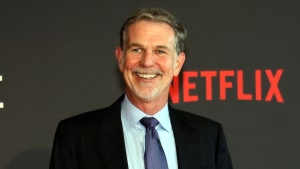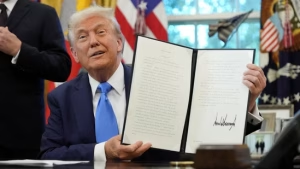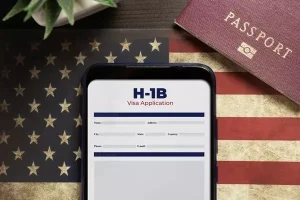Washington D.C. – In a surprising endorsement, Netflix co-founder backs Trump’s H-1B visa fee, arguing that the controversial $100,000 charge could strengthen the American labor market. Reed Hastings, who has followed H-1B policy for over 30 years, said the measure will focus the visa program on “very high value jobs” and bring more certainty to applicants.
Reed Hastings’ public endorsement

The announcement that Netflix co-founder backs Trump’s H-1B visa fee came through a post on X. Hastings described the new policy as a “great solution” to decades-long concerns about the program. He argued that with the steep cost barrier, only companies pursuing high-value roles would seek visas, reducing the reliance on a lottery system and giving applicants greater predictability.
What the policy entails

Under the order signed by Donald Trump, companies must pay a $100,000 fee when applying for new H-1B visas. The rule came into effect immediately and is scheduled to last one year, though it may be extended. Supporters emphasize that Netflix co-founder backs Trump’s H-1B visa fee because it is designed to prevent misuse of the program, particularly by firms hiring en masse for lower-cost roles.
Clarifications from the White House
Amid widespread confusion, officials clarified that the new measure is a one-time fee applied only to new applicants, not an annual recurring cost. White House spokesperson Karoline Leavitt stated that current visa holders will not be charged upon re-entry. Despite this clarification, the fact that Netflix co-founder backs Trump’s H-1B visa fee continues to fuel debates about whether the policy helps or hinders America’s competitiveness.
Global concerns in the tech sector


News that Netflix co-founder backs Trump’s H-1B visa fee has resonated across the tech industry. Major firms such as Microsoft, JPMorgan, and Amazon advised employees on H-1B visas to remain in the United States, while urging those abroad to return quickly. The fear was that confusion over the policy could affect mobility and discourage talent from entering the US tech market.
Online reactions and criticism
The endorsement sparked mixed reactions online. While some praised Hastings’ perspective, others pointed out inaccuracies. Critics emphasized that the fee is a one-time payment, not a yearly tax. One user argued that the claim was misleading, while another stated that such costs make hiring foreign workers riskier, slowing companies down and potentially driving talent to other countries. Still, the fact that Netflix co-founder backs Trump’s H-1B visa fee gave legitimacy to the policy in some circles.
Impact on foreign talent
The H-1B visa system has long been a pathway for skilled foreign professionals, particularly in technology and engineering, to work in the United States. With Hastings’ endorsement, the view that Netflix co-founder backs Trump’s H-1B visa fee has been framed as a call to reserve the program for only the most specialized, high-paying jobs. However, opponents argue it will restrict opportunities for capable professionals and reduce diversity in the workforce.
Political and economic implications


Supporters believe that the fact Netflix co-founder backs Trump’s H-1B visa fee strengthens Trump’s case for restructuring immigration policies to prioritize American jobs and high-value industries. On the other hand, critics warn that steep fees could make the US less attractive to global talent and increase outsourcing. Economists note that while the fee may generate revenue, it could also discourage smaller firms from hiring international workers.
Temporary but extendable rule
The proclamation states that the visa fee policy will expire after a year unless renewed by the administration. Whether it continues will depend on an assessment of its impact on the US economy and workforce. While the rule remains temporary, the fact that Netflix co-founder backs Trump’s H-1B visa fee suggests that some industry leaders may push for its extension if they see positive results.
Broader debate about fairness
The endorsement reignited the broader conversation about fairness in the H-1B system. For decades, critics argued that the lottery-based system created uncertainty and favored large outsourcing firms. By emphasizing that Netflix co-founder backs Trump’s H-1B visa fee, proponents frame the fee as a corrective measure to prioritize quality over quantity. However, opponents argue it unfairly penalizes businesses and international workers.
Conclusion
The revelation that Netflix co-founder backs Trump’s H-1B visa fee has added a powerful corporate voice to one of the most divisive policy changes in recent memory. Hastings’ support highlights the tension between ensuring high-value employment and maintaining global competitiveness. As debate continues, the policy’s future remains uncertain, but one thing is clear: the discussion surrounding America’s most important work visa has been reignited with fresh urgency.

